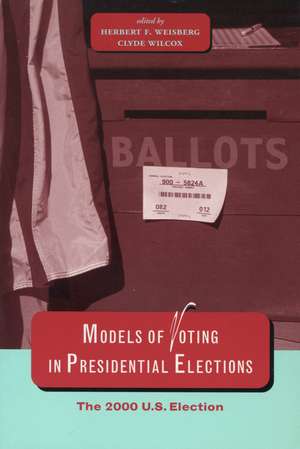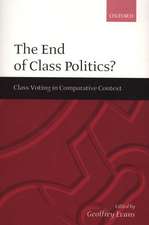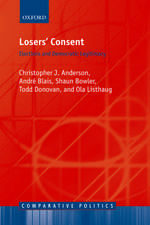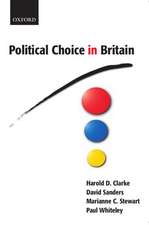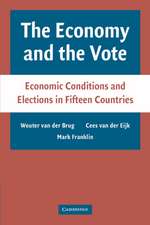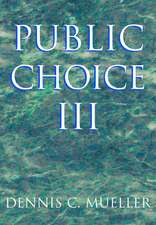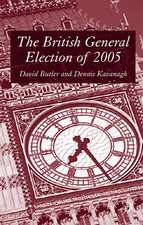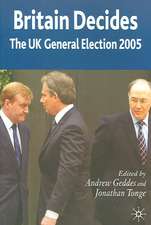Models of Voting in Presidential Elections: The 2000 U.S. Election
Editat de Herbert Weisberg, Clyde Wilcoxen Limba Engleză Paperback – 29 sep 2003
Models of Voting in Presidential Elections offers a comprehensive scholarly examination of the determinants of voter participation and vote choice at play in the 2000 presidential election. Unlike other books that focus exclusively on the drama and unusual circumstances of the 2000 election, this account examines larger issues surrounding the election and its outcome, asking why an election that traditional forecasting models predicted would provide a strong and clear victory for one side was ultimately so close.
Using a variety of models, the authors explore why the election was so close, what happened to the landslide that economic forecast models had predicted, and whether our traditional theories and approaches require reevaluation in light of the outcome.
This book analyzes a variety of matters fundamental to the 2000 election, including the influence of Bill Clinton, his dual legacy, and the economy. The authors detail changing voter coalitions and the influence of a gender gap. They also describe the role of divided government, how voter turnout affects election outcomes, the impact of minor-party candidates, and, more generally, the relative importance of partisanship, candidates, and issues.
Using a variety of models, the authors explore why the election was so close, what happened to the landslide that economic forecast models had predicted, and whether our traditional theories and approaches require reevaluation in light of the outcome.
This book analyzes a variety of matters fundamental to the 2000 election, including the influence of Bill Clinton, his dual legacy, and the economy. The authors detail changing voter coalitions and the influence of a gender gap. They also describe the role of divided government, how voter turnout affects election outcomes, the impact of minor-party candidates, and, more generally, the relative importance of partisanship, candidates, and issues.
| Toate formatele și edițiile | Preț | Express |
|---|---|---|
| Paperback (1) | 228.19 lei 3-5 săpt. | |
| Stanford University Press – 29 sep 2003 | 228.19 lei 3-5 săpt. | |
| Hardback (1) | 778.23 lei 6-8 săpt. | |
| Stanford University Press – 29 sep 2003 | 778.23 lei 6-8 săpt. |
Preț: 228.19 lei
Nou
Puncte Express: 342
Preț estimativ în valută:
43.66€ • 45.68$ • 36.27£
43.66€ • 45.68$ • 36.27£
Carte disponibilă
Livrare economică 12-26 martie
Preluare comenzi: 021 569.72.76
Specificații
ISBN-13: 9780804748568
ISBN-10: 080474856X
Pagini: 320
Dimensiuni: 152 x 229 x 20 mm
Greutate: 0.45 kg
Ediția:1
Editura: Stanford University Press
Colecția Stanford Law and Politics
ISBN-10: 080474856X
Pagini: 320
Dimensiuni: 152 x 229 x 20 mm
Greutate: 0.45 kg
Ediția:1
Editura: Stanford University Press
Colecția Stanford Law and Politics
Recenzii
"A scholarly and intellectually interesting collection that will provide students with good examples of analytic approaches to studying elections. It is the best collection available on the 2000 election and should have genuine appeal to anyone interested in the 2000 election and American politics more generally." —George Rabinowitz,University of North Carolina
"Few books cover the topic of modeling presidential elections in such an accessible manner. None had a more fascinating election than the 2000 election to work with." —John C. Green,The University of Akron
Notă biografică
Herbert F. Weisberg is Professor of Political Science at the Ohio State University. Clyde Wilcox is Professor of Government at Georgetown University.
Textul de pe ultima copertă
“A scholarly and intellectually interesting collection that will provide students with good examples of analytic approaches to studying elections. It is the best collection available on the 2000 election and should have genuine appeal to anyone interested in the 2000 election and American politics more generally.” —George Rabinowitz,University of North Carolina
“Few books cover the topic of modeling presidential elections in such an accessible manner. None had a more fascinating election than the 2000 election to work with.” —John C. Green,The University of Akron
“Few books cover the topic of modeling presidential elections in such an accessible manner. None had a more fascinating election than the 2000 election to work with.” —John C. Green,The University of Akron
